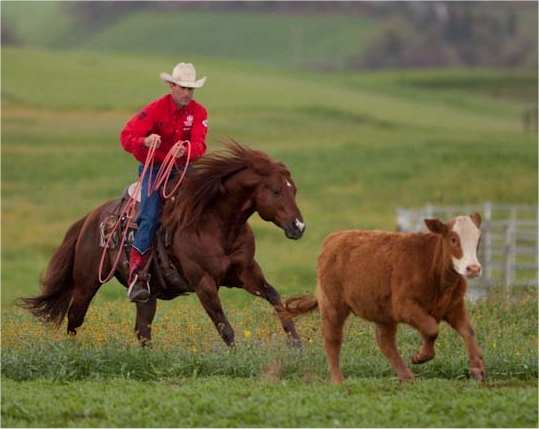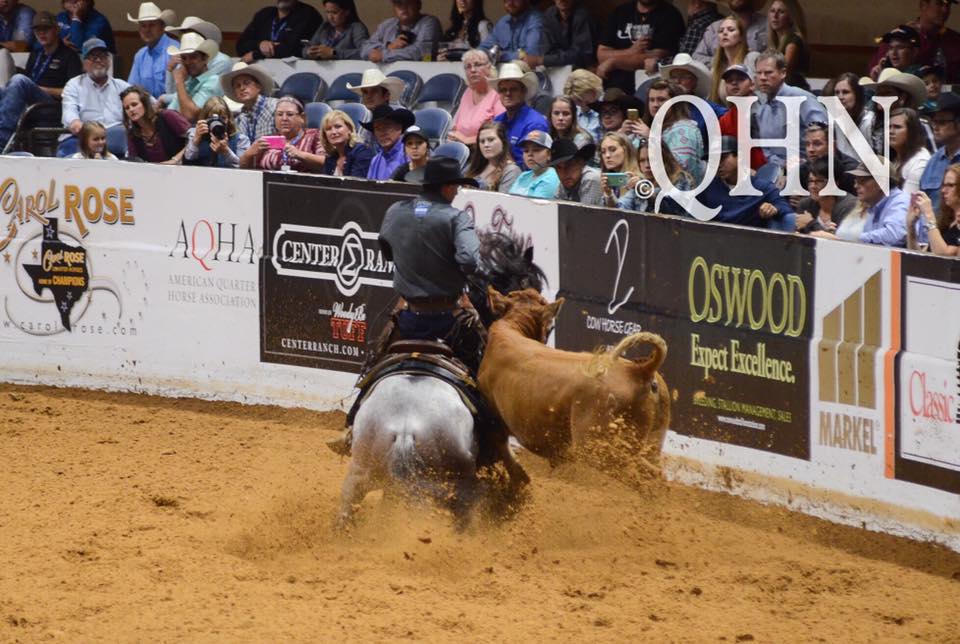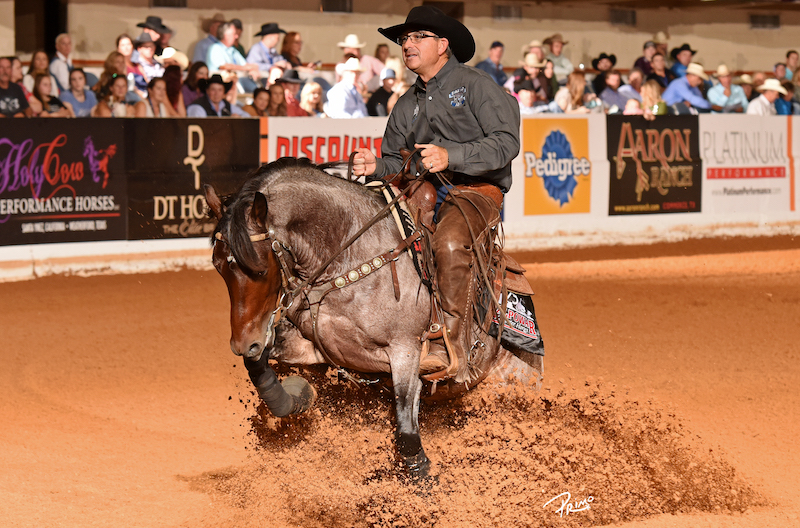Arena All-Star Topsails Rien Maker
By Western Horseman May 25, 2016

“Slider” started small, but has paid off big for his owners. The leading reined cow horse of all time, he has carried Russell Dilday to three World’s Greatest Horseman titles.
A big personality and even bigger talent arrived in a small package when Topsails Rien Maker was foaled in 1999.
The sorrel colt, with his distinctive snip nose and inquisitive nature, was bred to be a cow horse. Sired by Topsail Cody, he is out of Jameen Gay by Toby Gay Bar, a son of Gay Bar King.
When then-owner Dana Roulet took him to trainer Russell Dilday in Porterville, California, when he was a 2-year-old, Dilday was immediately taken by the colt.
“He just had a lot of personality,” Dilday says. “He was very easy to train, but had a lot of quirky stuff. He’d sling his head around and play. Of course he was a stud, but we hauled him in the stock trailer with all the other horses, and he never acted like a stud. He’s constantly squirreling out of his halter. If you’re watching him, he’ll just stand there. When you’re not looking, he’ll rub it off his ear.”
The fact that Topsails Rien Maker didn’t get any special attention probably helped him develop his relaxed nature. But Dilday discovered much more than that; he found that the horse had talent to spare.
“He was just too easy [to train],” he remembers. “The stuff you get away with on him does not work with other horses. I really didn’t do a lot of training on him. He just kind of did stuff.”
Roulet bought Topsails Rien Maker from his breeder, the Stellato Revocable Trust in Redding, California. Dilday began showing him in 2002 and won the limited open championship at the Fresno Futurity and reserve in the same class at the National Reined Cow Horse Association’s premier event, the Snaffle Bit Futurity. In 2003, he began earning consistent checks at smaller shows. When Roulet decided to sell him, Dilday wanted to find a way to keep the colt—nicknamed “Slider”—in his barn.
“[Trainer and breeder] John Ward had a mare he was wanting to sell,” Dilday says. “I told John that Dana wanted to sell my horse, and he said we’d just trade [the mare] for him and partner on him. It was complex, but when it was all done John and I were partners on the horse. We owned him for a few months, then I sold John’s half to Kevin Cantrelle.”
Cantrelle, a longtime friend of Dilday and his wife, Tanna, was already a customer and had seen Slider at work.
“Russell called me quite a few times, bugging me,” says Cantrelle, who lives in Raymond, California. “And he just kept bugging me for about four months, until I said, ‘Okay, fine, I give in!’ And here we are today.”
His investment, and Dilday’s belief in the horse, soon began to pay off. Between 2004 and 2007, Slider and Dilday won their fair share of big checks at premier events, including top five finishes at the World’s Richest Stock Horse competition and the Magnificent 7. In 2007, they finished 10th at the World’s Greatest Horseman contest, held during the NRCHA World Championship Show. Like the World’s Richest and Magnificent 7, the World’s Greatest Horseman competition pits horse-and-rider teams in four events: herd work, reined work, steer stopping and cow work. As it turned out, that year was just a warm-up for Slider and Dilday.
The trainer, though, says he didn’t have Slider where he needed to be for quite some time, according to traditional vaquero methods of training first in the snaffle and then the hackamore before moving on to the two-rein and finally the bridle. Trainer and NRCHA Hall of Fame member Ronnie Richards encouraged him to get the horse better prepared.
“He wasn’t broke at all in the hackamore until the second year,” Dilday says. “Ronnie helped me with some basic hackamore training. Slider got pretty decent, and then I went on to the two-rein. When I went to bridling him up, I got some help from Ronnie again.”
Dilday says he always knew Slider had something special; he just needed advice to get the most out of the horse.
“His fence work was always spectacular,” he says. “The first time I showed him, he had a huge fence work, and he just continued to do that.”
Dilday eventually turned to reining trainer Donnie Bricker to improve his reined work, and Slider responded.
“There wasn’t a ton of drilling on him,” Dilday recalls. “When I got my [technique] right, he did whatever I was asking. There are horses that you ride better, but they don’t change, and that’s a lot tougher to get around. With him it was instant gratification. He was wanting to do it right in the first place.”
When everything came together, it did so in a big way. In 2008, Slider and Dilday won the World’s Greatest Horseman and World’s Richest Stock Horse, and also took home the top prize in the open bridle class at the NRCHA Stakes.
Winning the World’s Greatest Horseman is tough to do once, but the four-event competition was something Dilday couldn’t resist. In 2009, they again claimed the title, making Slider the first horse to claim back-to-back championships at the event.
In 2010, a few bobbles cost him and he ended up in fourth place. Dilday started getting help from cow horse legend Don Murphy, and it paid off.
“I felt like I got my fence work back. I had been slacking off there somewhere, but Murphy doesn’t let you do that,” Dilday says with a laugh. “I went the third year because no one’s ever won it three years in a row. I kind of dropped the ball. I didn’t want to end on a note like that.”
The duo returned this year and managed an unprecedented third World’s Greatest Horseman championship. His winnings at that event—which pays $30,000 for first place—helped make the 12-year-old stallion the leading money-earning reined cow horse in history, with earnings totaling $320,356.
Dilday says part of the key to Slider’s longevity is that he doesn’t take a lot of training between the preliminary rounds and the finals.
“I’ve always had almost as much horse for the finals as I’ve had in the prelims,” he says. “That’s a big thing with an older horse, especially.”
For Cantrelle, buying into a horse like Slider seemed like a gamble, but it was more like a sure bet. He just didn’t believe it for a while.
“When you buy something, you always think you’re going to win,” he says. “It usually doesn’t work out that way, but you’ve got a lot of hopes. He’s been a lot of pleasure for us, a lot of excitement and some heartbreak. Bad things do happen once in a while. But you couldn’t ask to have a better horse. I’m just thankful we got the opportunity to end up owning him.”
As for Dilday, he’s enjoying riding some young horses sired by Slider, and doesn’t discount heading back to the World’s Greatest Horseman with the stallion.
“If he feels good, I’ll try it again,” he says.
Although he rode a mare named Miss Plain Plain to win the 2003 Magnificent 7 and take two reserves at World’s Greatest Horseman, he credits the stallion for his successful career.
“Miss Plain Plain was a big boost for me, and I had a couple of other pretty good ones, but he’s 80 percent of my career, easily,” he says. “I haven’t learned as much off any three horses as I’ve learned from him. He has been spectacular. And he has such heart and personality, I can’t not love him.”




